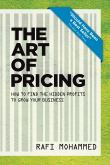J.C. Penney: Ditch the Risky Pricing Strategy
Reprinted from the Harvard Business Review website.
While I was dubious about J.C. Penney's switch to its Fair and Square Everyday Low Pricing Strategy, even I have been surprised at how miserably the strategy is faring so far.
During its first quarter under the new pricing strategy, same store sales dropped by 18.9%, store visits decreased by 10%, and the average spend was down by 5%. As a result, the retailer lost $163 million (compared to earning $64 million in the first quarter of 2011) and suspended its quarterly dividend. J.C. Penny's stock, which bounced above $43 per share after CEO Ron Johnson enthusiastically announced the new pricing strategy in January, now trades below $30.
During an investor conference call in mid-May, Johnson claimed the big problem is that customers do not know about Penney's new pricing strategy. This is a lesson that all businesses can learn from — and one I often see in my own work of developing new pricing strategies. While companies, investors, and the press may be excited about a new pricing strategy, buyers are slow to pick up on changes and nuances of a new pricing strategy. Shifting from offering 590 promotions annually to a trimmed down Everyday Low Price Strategy, as J.C. Penney did, is a big change to communicate to shoppers. J.C. Penney now believes that success lies in better explaining its pricing strategy through new advertisements.
While Mr. Johnson and his supporters are seeking patience — 12 to 18 months — I think it's time to pull the plug. Sure, in an ideal world, it'd be great if J.C. Penney did not have to run hundreds of expensive promotions annually to draw consumers into stores and shoppers would happily purchase knowing that they are getting a good (but not necessarily the best) deal. Unfortunately, shoppers do not behave this way - they love deals. Mr. Johnson and his colleagues now refer to coupons as "drugs" — with the implication that consumers are addicted to coupons. This is a good analogy — but my question is why is it up to J.C. Penney to take on the task of ridding consumers of their discount addictions? As we know from drug rehabilitation, it's hard for people to consider — let alone make — change. And even if they do make it through "rehab," there is a very high recidivism rate. Plus, remember all of Penney's competitors are tempting customers with coupons and sales. This "mission of consumer rehabilitation" really seems like a daunting challenge that J.C. Penney doesn't need to be taking on right now.
The best retailers succeed by offering highly differentiated products (as the Apple Store does) or a unique shopping experience (as Nordstrom or Target does). Today, J.C. Penney sells semi-differentiated products and provides a ho-hum shopping experience — it doesn't have much "mojo" to draw customers into its stores. So what's the only lever that can excite and bring in customers to make often discretionary purchases? Discounts...
I believe that even if customers fully understand its pricing strategy, J.C. Penney is not going to get the revenue/loyalty windfall that it is hoping for. It's time to put pride aside and revert back to a discounting strategy. In the short term, promotions will turn around revenue and mollify anxious investors. In the medium term, as the company executes on a plan to open new boutiques within its stores, discounts will continue attracting customers as well as provide incentives to check out the new boutique offerings. Finally, in the long term, once the 80 — 100 boutiques and Town Square shopping environment are in place, J.C. Penney can properly roll out its long envisioned Everyday Low Pricing strategy. At this point, its pitch to customers can be along the lines of, "Come for our unique products (boutiques) and hip shopping environment (Town Square) — and while you are here, pick up all of your staples at 'fair and square' prices."
Revitalizing the weary J.C. Penney brand is a grand challenge — especially in the midst of the current tug of war between e-tailers and bricks and mortar stores. Mr. Johnson's long term vision of offering unique products and shopping experiences — much like the Apple Stores that he designed — makes great sense. But why at this early stage of such an ambitious transformation is J.C. Penney focusing its energies and credibility on getting customers to go cold turkey on discounts, especially when it knows that effecting consumer change is hard and rivals are eagerly encouraging shoppers to go "off the bandwagon?" This haphazard diversion is torpedoing the larger and more important mission.
So what do you think? Should J.C. Penney be focusing its energies on weaning customers off of "drugs"? Is it time for J.C. Penney to throw in the towel or hold course and hope the new ads will save its pricing strategy?





JCP's problem isn't its price strategy, it's the 'square deal' advertising. It continues to focus the buyers attention on price instead of the advantages of everyday pricing. The reason buyers don't get it is that it has been communicated so poorly. Also, JCP has historically been a mid-market company, not the discounter that Walmart and Target have been. It's inevitable that they'll lose revenues as the price buyers, those who only bought on heavy discounts, leave. The key is to replace those customers with people who prefer a mid-range offering and are willing to pay a premium over the discount stores to get it. Their advertising is simply not accomplishing that goal. I don't believe that JCP needs to abandon its pricing strategy, it needs to do a better job of marketing its offerings.